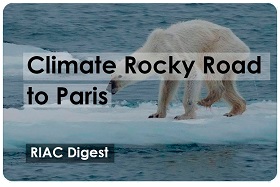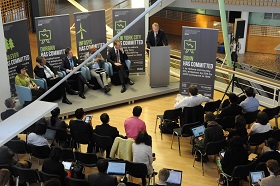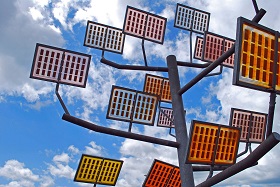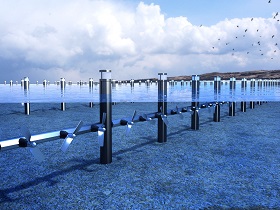On the 30th of November 2015 world leaders will gather in Paris to forge a new international climate change agreement. The goal of the 2015 United Nations Climate Change Conference (COP21) taking place in the French capital is to reach a universal commitment to maintain the global increase in average temperature under 2C above pre-industrial level. Most scientists have so far agreed that this is the critical threshold which, if exceeded, would lead to irrevocable catastrophic consequences for our planet.
Climate change has undoubtedly become a key concern on the international policy agenda. The issue has been recently raised at all major multilateral forums, including the UN General Assembly, BRICS, G20, APEC, and is no longer confined to the UNFCCC platform. Climate change has grown in prominence as a national security threat in a number of countries, including the European Union, the United States, Japan. The Russian government has also officially acknowledged the threat of global warming to the country’s security despite a lack of policy response.
COP21 will be the largest conference the French government has ever organised bringing together 40,000 delegates from 195 countries. At least 100 heads of state are expected to join the talks at Le Bourget in Paris with, among others, United States’ Barack Obama, China’s Xi Jinping, Britain’s David Cameron and India’s Narendra Modi. The attendance of Russia’s President Vladimir Putin has recently been announced by France’s Foreign Minister Laurent Fabius and later confirmed by the Assistant to the President of Russia Yuri Ushakov. Hence, leaders of the four largest carbon-emitting states as well as leaders of the European Union, third largest emitter, will be present at the negotiating table in Paris.
All eyes are now on COP21, which is the culmination of a lengthy and comprehensive diplomatic effort to draft a universal agreement that would replace the Kyoto Protocol. As costs of inaction, both environmental and financial, continue to mount, the conference in Paris is highly important. It is seen as the “last effective opportunity” to avert dangerous consequences arising from climate change. As climate change concerns are increasingly aligned with traditional foreign policy priorities, international climate negotiations are developing into an even more prominent diplomatic platform.
After prolonged tensions in relations between Russia and the West amid the situation in Ukraine and subsequent sanctions, 2015 climate summit is an outstanding chance for Russia to reengage with the European Union and the United States. Sound and careful diplomacy together with a pledge to develop a more scrupulous approach to mitigation policies could reinvigorate Russia’s role in climate negotiations and make it a crucial actor at COP21. Along with the diplomatic success of the Iran Deal and the Syrian Crisis, climate talks could bring Moscow, Brussels and Washington closer together through rediscovered common interests.
Be as good as your word
Over the past two decades the nature of global climate diplomacy has in fact shifted away from the top-down framework of Kyoto Protocol to a bottom-up approach with nationally driven initiatives at its core. A review of legislations in 99 countries responsible for 93% of global emissions, carried out by the Grantham Research Institute on Climate Change and Environment in collaboration with GLOBE, revealed that by the end of 2014 there were 804 climate change laws and policies. This figure represents a significant progress compared to the 54 laws and policies observed in 1997 and 426 in 2009, the year the Copenhagen Accord was signed. Hence, prominent actors in climate negotiations are now expected to come forward with clear-cut emission reduction strategies, backed up by ambitious domestic mitigation policies.
Additionally, the United States, previously defiant on the issue of global warming and still strongly criticised for pulling out of the Kyoto Protocol, pledges to a notable 17% reduction in greenhouse gas (GHG) emissions by 2025, compared to 1990. The United States also entered into a number of bilateral climate agreements, including a deal with China, the largest emitter of CO2, and India, fourth major GHG emitter. Washington’s proactive engagement in climate diplomacy could sideline governments historically skeptical of climate change, namely Canada, Australia and Russia, at the summit in Paris and beyond.
So far, Russia has been occupying a peripheral position within the international climate change debate, as its proposed mitigation targets have been very limited and are underpinned by weak domestic climate policies. Ahead of COP21 Moscow pledged to cut its GHG emissions by 25-30% by 2030 compared to 1990 levels. Although, Russia strictly respected the deadline in submitting its “intended nationally determined contribution” (INDC) and was among the first to do so, demonstrating some goodwill, the pledge in itself is ambiguous. Indeed, the Climate Action Tracker concludes that existing policies would be enough to achieve the highest end of the 2030 target.
Furthermore, Russia’s target also accounts for carbon dioxide absorption by the country’s boreal forests. The Carbon Brief thus suggests that it is enough for Russia to simply manage its forests to reduce its emissions by 500 million tonnes of CO2 yearly, as this figure already represents the absorption capacity of its natural carbon sink. Above all, the implementation of its INDC is contingent on the outcome of the upcoming conference in Paris and pledges of other major carbon emitters. Russia’s position therefore lacks a clear signal that the country is determined to combat global warming domestically, which could entail a reputation cost under bottom-up framework of COP21.
From rhetoric to action
The opinion that Russia could benefit from climate change through shorter winters, better temperature for food growth and better access to Arctic oil and gas has been voiced in the country. Although there is a lack of understanding of the climate change issue within Russia’s civil society, the government acknowledges the imminent threat of global warming to the country’s economy and security. Moreover, Roshydromet, the Russian Federal Service for Hydrometeorology and Environmental Monitoring recognises that meteorological phenomena could become more frequent and intense, negatively affecting the agricultural, housing and infrastructure sectors. Subsequently, the government is actively focusing on developing climate-related action plans and laws, aiming at improving energy efficiency and modernising the energy sector.
The Climate Doctrine was approved by the president in 2009 and was a major step in the formulation of Russia’s mitigation strategy. It serves as a guideline for climate legislation and emphasises the will to engage with the international community on the issue of global warming. A decree, adopted in 2013, spelled out the target to reduce emissions by 25% below 1990 levels by 2020 and a draft action plan to attain this goal was formulated in March 2014. Furthermore, an objective to increase the share of electricity generated from renewables (excluding hydropower station with a capacity over 25MW) to 1.5% in 2010, 2.5% in 2015 and 4.5% in 2020 was set out. Russia did not meet its interim targets and backtracked on its objective in 2014, cutting the desirable share of renewables to only 2.5% by 2020.
Russian government has also developed a number of non-climate-specific legislations that could benefit efforts to reduce GHG emissions, including a number of federal and regional programmes as well as regulations to improve energy efficiency and to promote energy saving. Additionally, a government decree from 2009 addressed excessive gas flaring and imposed fines for more than 5% gas flaring or the absence of measurement equipment starting from 2012. Listed above are constructive political initiatives that send a strong signal of intent, although Russia would improve its standing in international climate negotiations by strengthening the climate-specific legislation. The implementation of the regulations in place should also be strictly controlled.
Importantly, climate policies of other major states are to a large extent motivated by their economic considerations. For instance, the European Union in its climate policy aims above all to achieve energy self-sufficiency by switching to renewables. When it comes to reducing emissions from fossil fuels combustion in Russia, there is little economic incentive to such mitigation measures and hence there is a lack of political will. Resultantly, Russia’s climate policy is so far incomprehensive and unambitious. Proposing a more challenging INDC and adopting a sound political course of ambitious reforms, particularly in energy efficiency and infrastructure modernisation, could be economically justified and resultantly beneficial both domestically and internationally.
Standing on common ground
It is important not to underplay the importance of Russia at the COP21 conference due to its strong negotiating position. As one of the largest carbon emitters with a delegation of highly qualified diplomats, the country could make or break the deal. For instance, in 2004 the ratification of the Kyoto Protocol by Moscow was crucial for the treaty to take effect after the United States, the largest GHG emitter at the time, opted not to join.
Additionally, Russia is traditionally part of the Umbrella Group, also including the United States, Canada, Australia and Japan, among others. The country is a member of BRICS and is enjoying close ties with China. Moscow and Beijing have established a joint “development and climate change” working group ahead of the Paris summit. Therefore, at COP21 Russia is uncommonly positioned between the developed and developing countries and could potentially be a useful intermediary, simultaneously boosting its diplomatic prominence. Most disagreements in the climate negotiations indeed traditionally stem from the Global North-South divide around the issue of responsibility for GHG emissions and finance.
Furthermore, Russia’s position on the desirable outcome of COP21 is consonant with that of the European Union in that both aim to reach a universal and legally binding agreement. On the other hand, the United States opposes the signing of a legally binding treaty. The upcoming conference in Paris is seen as a last chance to make a comprehensive effort to combat global warming and stakes are high. Therefore, there is an opportunity for Russia to collaborate closely with the European Union in influencing the United States and the outcome of COP21. Such engagement in climate diplomacy could draw parties closer together and lead to the restoration of trust.
Vladimir Putin will attend the Paris summit and will have a chance to meet his counterparts from the United States, the European Union, China, India as well as other countries. After the G20 summit, where the Heads of Russia and the United States conversed in private, Barack Obama’s assessment of Russia’s foreign policy has significantly softened. COP21 could bring further thaw in the Russia-West strained relations. Notably, climate change unlike other current foreign policy concerns is an issue where all the countries are on the same side; they will meet in Paris to reach the exact same goal. Although disagreements exist on how to attain this goal, the overall atmosphere is that of collaboration not confrontation.
***
In recent years, Russia has been occupying a marginal role in international climate negotiations. However, in advance of COP21, the government has taken action to position the country as a player prepared to actively engage in climate diplomacy in Paris. Vladimir Putin and the Russian delegation will have an opportunity to collaborate with world leaders, which could push Russia further out of its recent estrangement with the West.
Domestic climate policies remain weak due to the lack of economic incentives and political will. In the current bottom-up climate diplomacy system, national initiative is crucial for an actor to be able to occupy a prominent position in negotiations. Russia will therefore need to formulate more ambitious targets, design rigorous policies and effectively implement them to demonstrate its commitment to address the threat posed by climate change.








